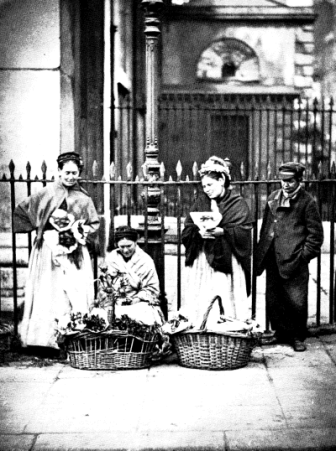
I often wonder what the Victorians would make of our society if they could visit it. I imagine they’d be both awed and shocked if they were able to time travel forward to 21stcentury London. Awed by the technology perhaps: the cars, neon lights, television, mobile phones. Shocked by what they would see as irreligion, immorality and a lack of deference.
Of course the idea that the Victorians were prudish and all went to church has been successfully challenged by historians but it remains a fact that they were more conservative and less tolerant of some behaviours than we are today. Homosexuality was made illegal in 1885, and men could be sent to prison for engaging in sexual relationships with other men, as Oscar Wilde was. Suicide was a crime and there was considerably less understanding of mental illness throughout the period. The criminal justice system was harsh: many more people were incarcerated for relatively minor property offences and the death penalty existed, and was used, for murderers.
The newspaper reports of the metropolitan Police Courts are an excellent way to peer into this world. To quote Hartley, ‘the past is a foreign country; they do things differently there’, and we can see this at Bow Street, Lambeth, Marylebone and all the other magistrate courts.
At the end of June 1886 two individuals were brought up at Lambeth Police court charged with begging. Begging remains an offence punishable under nineteenth-century legislation (the Vagrancy Act of 1824) but it no longer carries the risk of prison and is often ignored by the police unless it is aggressive or causing a particular nuisance. So while retain the power to prosecute beggars we rarely use it. Instead the emphasis is on helping those that beg, or (more cynically) in arguing about how best we should help them.
In 1886 there was a Mendicity Society; an organisation dedicated to the prevention of begging, especially by those it deemed to be imposters. I’ve written about them before and their officers crop up frequently in cases that came to court. Joseph Boseley was one such officer and on the evening of Monday 28 June he was watching two beggars in Church Street, Camberwell.
Both appeared to be women and they held a Bible out to read from. As passers-by approached they would ask for a donation and if it was forthcoming they would reward the donor with a verse of scripture. However, if they were refused money, then, ‘as soon as the person walked on [they] made use of foul language to one another’. Boseley smelled a rat and he arrested them for impersonation.
Boseley knew this pair well and was watching them to gather sufficient evidence against them to prosecute. He knew also that they weren’t both women: one of them was a man dressed up as a woman, and this was assumed, I think, to be a ruse to separate pedestrians from their hard earned cash, as a pair of females asking for charitable donations to a ‘good cause’ seemed more believable.
In court the pair cut a sorry looking vision in the dock. Mary Ann Saunders was 55 and her partner, Henry Bennett ten years younger. Bennett was set in the dock still wearing ‘female clothing, with hat and ribbons, and hair hanging down his back’. When questioned he continued to speak in a high-pitched impersonation of a female voice, as he had being doing as he stood beside the kerb in Camberwell.
Boseley told the magistrate (Mr Biron) that there had been multiple complaints about the duo and that they ‘were old mendicants’. Saunders could often be seen pushing Bennett around in ‘a perambulator’, always dressed as a woman, and always begging for money. He saw them as a couple of charlatans who were entirely underserving of the public’s sympathy, let alone their money.
Today however, I wonder what we would make of them. Was Bennett merely donning female attire as a ruse to con people, or was he cross-dressing because he felt more comfortable in women’s clothes? We have only very recently begun to accept that gender is more fluid and the term ‘transgender’ wasn’t coined until 1971. In 1870 two men were put on trial for transvestism, but there was insufficient evidence to convict them.After 1885 men who dressed as women were sometimes prosecuted as homosexuals, again demonstrating a contemporary misunderstanding of those that cross gender boundaries.
The beginnings of attempts to understand transgender issues can be seen in the late nineteenth century but for a sympathetic understanding we have to wait till late into the twentieth century. Even now those that feel uncomfortable in the gender they were born into and who are brave enough to present themselves as the person they know and believe themselves to be can find it a very tough experience. We are only very slowly adjusting to the idea of all gender toilets and allowing people to be whom they want to be.
Was Henry Bennett ‘trans’? It is impossible to know of course. Mr Biron was convinced he was a beggar and said he would remand the pair for further enquiries. At this Bennett fainted in the dock, although the papers saw this as a yet another example of imposture and an opportunity to poke fun at him for the amusement of its readership. On the 9 July they were brought up again and the magistrate sent them both to prison for a month for begging, declaring them to be ‘rank imposters’.
As he was led away Bennett cried out: ‘A month, what for? I didn’t beg; I only give bits of scripture comfort’.
[from The Standard, Wednesday, June 30, 1886; Reynolds’s, Sunday, July 11, 1886]









